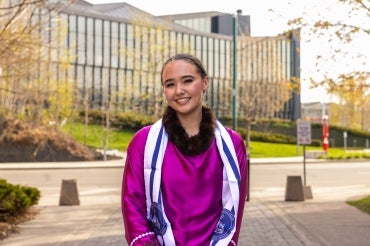U of T grad champions environmental causes, Indigenous empowerment

Allana Nakashook-Zettler, who will pursue a master’s degree in chemical engineering at U of T this fall, hopes to eventually find a job where she can continue making an impact (photo by Johnny Guatto)
Published: June 13, 2025
For Allana Nakashook-Zettler, studying at the University of Toronto wasn’t just an investment in her future – it was an opportunity to make an impact today.
An urban Inuk who is passionate about science and engineering, Nakashook-Zettler worked with one of U of T’s leading researchers to investigate the health impacts of industrial chemicals on people in northern Ontario. Later, during a co-op program placement at Environment and Climate Change Canada, she helped refine criteria for an emissions grant program to improve benefits for Indigenous communities.
In her spare time, she fostered community among her peers as an intramural volleyball captain, campus tour guide and Indigenous peer mentor.
“I’ve gotten so many amazing opportunities … and to see that I can have really impactful and meaningful change is really encouraging,” says Nakashook-Zettler, who will graduate on June 17 with a bachelor of applied science degree in chemical engineering from the Faculty of Applied Science & Engineering, where she will begin graduate studies in the fall.
“U of T has really created a path for me in my life and allowed me to see where I can make a difference.”
Born in Iqaluit, Nakashook-Zettler has lived in British Columbia, Newfoundland, Ontario and the Northwest Territories. She studied at U of T with the support of an Engineering Entrance Scholarship for Indigenous Students.
A former Girl Guide, she credits the organization’s strong female role models with inspiring her passion for STEM subjects. “A lot of them were engineers… they were able to bring that out of me and encourage me to pursue engineering.”
At U of T, Nakashook-Zettler sought out opportunities that combined her interests in sustainability, engineering and Indigenous empowerment. In her second year, for example, she joined a research project, led by University Professor Cristina Amon, a former dean of the engineering faculty, exploring links between benzene exposure and development of acute myeloid leukemia in children.
“This is important because communities in northern Ontario have seen an increase of acute myeloid leukemia in children under five … so they’re investigating the link to it and surrounding factories and processing plants,” Nakashook-Zettler says.
For Nakashook-Zettler, the project was a chance to elevate Indigenous knowledge systems, which have often been overlooked in Western science.
“From my perspective, knowing and understanding Western perspectives on research has helped me convey the importance of Indigenous Knowledge and its integration into all research, particularly engineering.”
After her third year, she completed a Professional Experience Year Co-Op Program placement at Environment and Climate Change Canada’s climate change branch. While reviewing funding criteria for emissions reduction projects, she noticed that the department’s “Indigenous co-benefits” requirement allowed companies with only superficial ties to Indigenous communities to qualify for federal grants. “As an Inuk, I didn’t really appreciate how it was written and could see there was vast room for improvement,” she says, adding that she shared her concern with her manager who sought her input on revising the requirement.
“It was phenomenal for my confidence,” she says. “It really pushed me to see the contributions I can make, especially as I’m still only a student.”
Back on campus, Nakashook-Zettler continued to build community through co-curricular activities.
As captain of two intramural volleyball teams, she prioritized connection as much as competition. “A lot of the time, you show up, play volleyball, don’t talk to each other and leave – but I intentionally fostered a sense of community and caring,” she says. “It not only made everyone happier – I feel like I created friendships that will last a lifetime – but it also helped us play better.”
She also became involved with First Nations House, mentoring first-year engineering students through the Indigenous Peer Group Mentorship initiative.
As a St. George campus tour guide, she emphasized the importance of community to incoming students.
“One thing I always tell them is that you have to be really intentional … my advice is to put yourself out there, talk to your professors and classmates, say ‘Yes,’ to go hang out or get lunch. Those are the important moments,” she says.
“Nobody’s going to remember what you got in your quiz on Oct. 12 in your second year, but you’re going to remember the fun times and moments. Making room for that and creating a balance for yourself will ultimately make you happier, but also open you up to more opportunities.”
Nakashook-Zettler is set to continue her studies at U of T, where she has been accepted into the master of engineering program in chemical engineering. Long-term, she hopes to find a job where she can grow and continue making an impact.
For now, she’s focused on celebrating her achievement and sharing the moment with loved ones.
“My family’s so proud of me,” she says. “On my mom’s side, I’m the first to graduate university with a bachelor’s degree. There’s such a sense of pride – it’s hard to describe in words.”



